Search
Computer Science MSc
Study level: Postgraduate
Elevate your expertise in computer science by integrating foundational theories with practical applications. Cover a range of advanced topics to give you a comprehensive understanding of the major challenges and opportunities of the field.
Course features
Year of entry
Location
Coventry University (Coventry)
Study mode
Full-time
With Professional Placement
Duration
1 year full-time
Up to 2 years full-time with professional placement
Course code
EEST029
Start date
January 2026
March 2026
May 2026
July 2026
Course overview
This course aims to equip you with the skills needed to drive innovations in fields like weather prediction, financial forecasting, medical diagnostics and customer behaviour analysis.
- Master core concepts: gain a deep understanding of essential computing principles, applications and technologies
- Explore fascinating fields: master practical skills and theoretical knowledge in artificial intelligence, cyber security, data science, and parallel and distributed computing, and learn how these areas continue to drive major developments and innovations in the domain of computer science
- Engage in vocationally driven study: course content is informed by professional practice and the needs of industry with a focus on your employability
- Hone your skills: specialise in cutting-edge fields like machine learning, big data, cloud computing, or high-performance computing.
5 QS Stars for Teaching and Facilities
QS Stars University RatingsVoted 1st in West Midlands for Postgraduate
Whatuni Student Choice Awards 2025Ranked 4th for Overall Satisfaction in PTES
Postgraduate Taught Experience Survey (PTES) 2025Why you should study this course
- Develop practical skills: engage in hands-on projects using modern, industry-standard hardware and software, preparing you for real-world challenges
- Gain industry-relevant professional skills: work with peers on real-world programming and software projects.
- Drive innovation: equip yourself with the skills needed to lead and innovate in the rapidly evolving computing industry.
- Gain practical experience: boost your CV with an additional professional placement. See the modules for more details.2
Accreditation and professional recognition

Chartered Management Institute
The module Advanced Software Development meets the criteria set by the Chartered Management Institute (CMI) for the CMI Level 7 Certificate in Strategic Management and Leadership Practice. Students who successfully pass this module will be eligible to gain the award as an additional qualification at no additional cost.
Collaborations
Visual Paradigm supports Coventry University with the use of UML tools, BPMN tools and agile story mapping tools, under the Academic Partnership Program.
Being part of this MSc course is one of the best decisions I have ever made. The course has provided me with the required problem-solving and IT skills to effectively apply knowledge in the real-world environment. I am truly grateful for this experience and would recommend it for any student.
Chidiebere Okeke, Computer Science MSc, 2022

What you'll study
Essential theoretical foundations are balanced with practical, hands-on experience through projects, research and industry advisory inputs, aiming to equip you with the latest skills to pursue a career in technology leadership, research, and development across diverse industries.
We regularly review our course content, to make it relevant and current for the benefit of our students. For these reasons, course modules may be updated.
How you'll learn
Teaching methods may include:
- lectures
- seminars
- tutorials
- presentations
- group projects
- workshops
- practical laboratory sessions.
Teaching contact hours
As a full-time postgraduate student, you will study modules totalling 180 credits each academic year. A typical 30-credit module requires a total of 300 hours of study. Study hours are made up of teaching contact hours, and guided and independent study.
Teaching hours
Teaching hours may vary, depending on where you are in your studies, but on average you will have between 8 and 12 teaching and learning hours each week. You will also have the opportunity to attend optional sessions including time with a Success Coach or to meet with staff for advice and feedback.
Guided and independent study
Throughout your studies, you will be expected to spend time in guided and independent study to make up the required study hours per module. You will be digging deeper into topics, reviewing what you’ve learnt and completing assignments. This can be completed around your personal commitments. As you progress to the end of your studies, you’ll spend more time on independent learning.
Online learning
As an innovative university, we use different teaching methods, including online tools and emerging technologies. So, some of your teaching hours and assessments may be delivered online.
Assessment
This course will be assessed using a variety of methods which could vary depending upon the module. Assessment methods may include:
- reports
- tests
- essays
- coursework
- assignments
- group work
- presentations.
The Coventry University assessment strategy aims to ensure that our courses are fairly assessed and allows us to monitor student progression towards achieving the intended learning outcomes.
Post studies, I secured a position as a Researcher/Software Developer for an SME in Cyprus, focusing on conducting research in the security domain through European funding. Having the opportunity to study at Coventry University has provided me with all required skills to secure this position. The constant updates of material throughout my course provided me with every chance possible to learn and use the latest and most useful technologies.
Kyriakos Georgiades, Computer Science MSc, 2022

Entry requirements
Typical entry requirements:
Fees and funding
| Student | Full-time | Part-time |
|---|---|---|
| UK, Ireland*, Channel Islands or Isle of Man | £11,200 per year £1,500 professional placement fee (if placement secured) per year |
Not available |
| EU | £11,200 per year with EU Support Bursary** £1,500 professional placement fee (if placement secured) per year with EU Support Bursary** £18,600 per year without EU Support Bursary** £1,800 professional placement fee (if placement secured) per year without EU Support Bursary** |
Not available |
| International | £18,600 per year £1,800 professional placement fee (if placement secured) per year |
Not available |
For advice and guidance on tuition fees3 and student loans visit our Postgraduate Finance page and see the university's Tuition Fee and Refund Terms and Conditions.
We offer a range of International scholarships to students all over the world. For more information, visit our International Scholarships page.
Tuition fees cover the cost of your teaching, assessments, facilities and support services. There may be additional costs not covered by this fee such as accommodation and living costs, recommended reading books, stationery, printing and re-assessments should you need them.
The following are additional costs not included in the tuition fees:
- Any optional overseas field trips or visits: £400+ per trip.
- Any costs associated with securing, attending or completing a placement (whether in the UK or abroad).
*Irish student fees
The rights of Irish residents to study in the UK are preserved under the Common Travel Area arrangement. If you are an Irish student and meet the residency criteria, you can study in England, pay the same level of tuition fees as English students and utilise the Tuition Fee Loan.
**EU Support Bursary
Following the UK's exit from the European Union, we are offering financial support to all eligible EU students who wish to study an undergraduate or a postgraduate degree with us full-time. This bursary will be used to offset the cost of your tuition fees to bring them in line with that of UK students. Students studying a degree with a foundation year with us are not eligible for the bursary.
Facilities

Lanchester Library
The library is usually open 364 days a year. It’s where you can access your course’s specialist Academic Liaison Librarian. It’s also home to specialist teams which can support you with your academic writing and maths and statistics questions.

The Hub
The Hub is the centre of student life on campus. Facilities include a food court, convenience store, multi-faith centre, medical centre, hairdresser, coffee shops and the Your SU offices. It has fully licensed function spaces and a bar.

Careers and employability
Get one-on-one guidance lasting up to 18 months from the end of your course. We’ll help you find placements and graduate roles, offer CV and application checks, mentoring, skills workshops, employer events and more.
Facilities are subject to availability. Access to some facilities (including some teaching and learning spaces) may vary from those advertised and/or may have reduced availability or restrictions where the university is following public authority guidance, decisions or orders.
Careers and opportunities
On successful completion of the course, you may choose to pursue a career as:
- Software Developer (App/web developer, embedded software developer / Internet of Things developer, cloud developer)
- Data Scientist
- Data Analyst
- Cloud Solutions Architect
- Cybersecurity Engineer
- Machine Learning Specialist
- AI developer or specialist
- Software Engineer.
On successful completion of the course, you will be able to:
- demonstrate advanced expertise across a range of programming paradigms and computing resources including parallel and distributed computing
- develop and understand algorithms to solve problems; identify algorithmic complexity; deploy a range of approaches to solving computationally hard problems
- understand key issues on cybersecurity, engage in ethical hacking, ensure software security across a range of platforms according to standards
- show proficiency in data science techniques and advanced AI and machine learning approaches to interrogating data
- create advanced software according to contemporary industrial practice and standards, involving teamwork, entrepreneurial skills, and leadership.
- become intellectually independent, develop and apply critical skills, identify research and innovation opportunities, motivate, develop and demonstrate solutions
- be familiar with professional practice, and act ethically, responsibly and sustainably
- demonstrate skills in strategic management and leadership practice.
Where our graduates work
Successful graduates of this course have gone on to work for companies such as:
- Infinitive
- Unity
- Next
- Loycol
- Booker Group
- Morse Micro
- Wordplay.
The course forced me out of my comfort zone and pushed me to learn for myself through building varied projects and learning to apply my knowledge in new ways. Wonderful lecturers shared their valuable practical experience and encouraged me to try new approaches even if it wasn't strictly necessary. It was a great year where I made friends from all over the world and experienced a modern university committed to continuously improving.
Bassel Ballout El Mawla, Computer Science MSc, 2022

How to apply
You may also like






